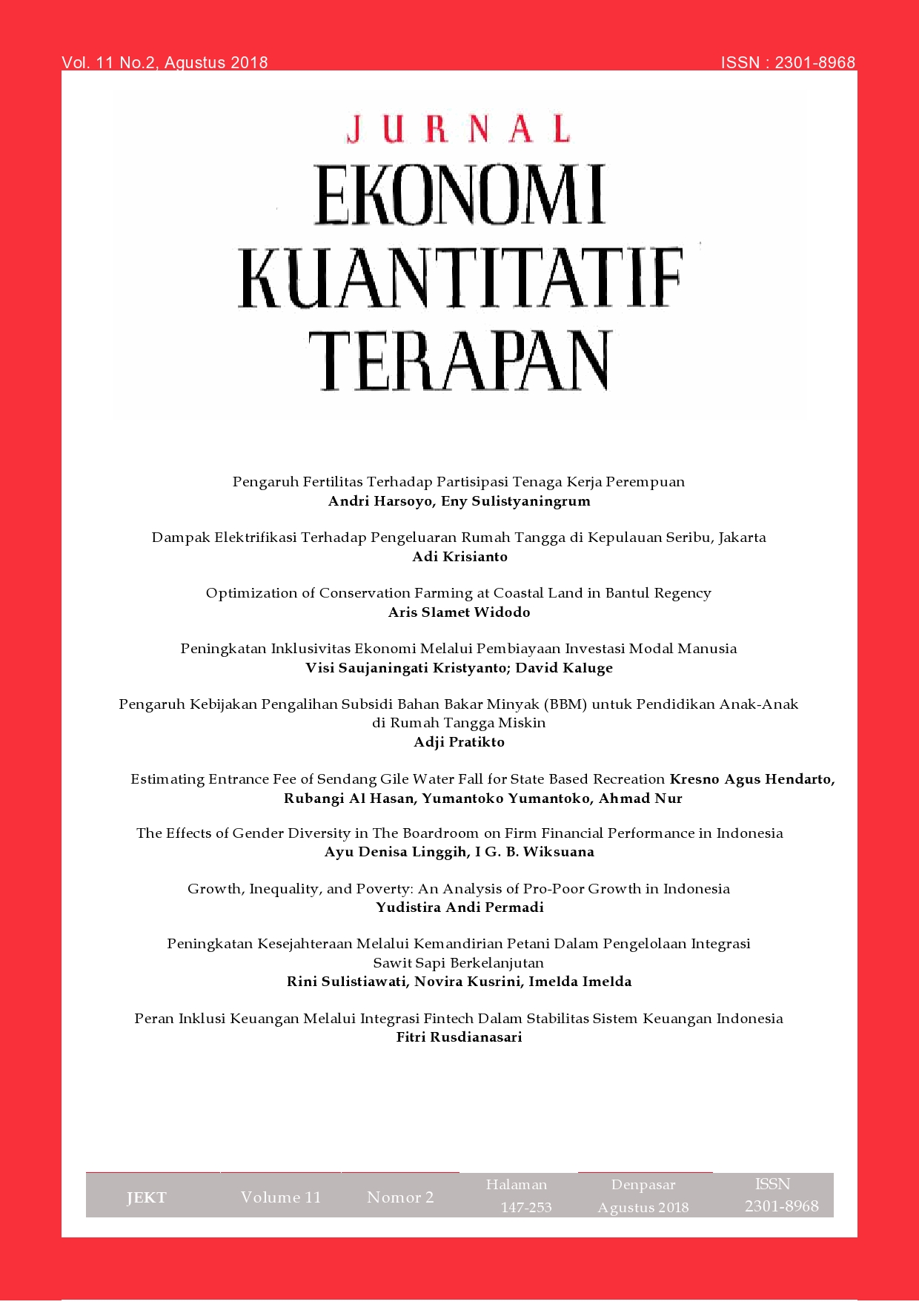Peran Inklusi Keuangan melalui Integrasi Fintech dalam Stabilitas Sistem Keuangan Indonesia
Abstract
Financial inclusion is a banking instrument that plays an important role in financial system stability through access and financial services. To improve financial performance, technology integration is now an interesting issue. This study aims to determine the role of fintech (financial technology) and other financial inclusion instruments such as MSME credit in influencing the stability of the Indonesian financial system. Error Correction Model (ECM) estimation is used to determine the long and short term effects through cointegration values ??between independent variables in influencing the dependent variable. The results of the analysis show that the number of bank branches has a significant long-term influence on financial stability through NPL performance, so direct investment directed at the banking sector also has a significant influence on financial system stability in the long run. However, fintech instruments such as ATMs and e-money have no significant effect on financial system stability. This condition was motivated by the limited reach of fintech development in the financial sector, especially for the unbankable community
Downloads
References
Abu Bader, Suleiman dan Abu Qarn, Ameer S. 2007. Financial Development And Economic Growth: The Egyptian Experience. Journal of Policy Modeling 30 (2008) 887–898
ADB. 2014. Adb.org
Apergis, Nicholas dan Payne, James E. 2010. Energy Consumption And Growth In South America: Evidence From A Panel Error Correction Model. Energy Economics 32 (2010) 1421–142.
Beck, T. and Levine, R. (2007) ‘Finance , Inequality and the Poor’.
Boef, Suzanna De. 2000. Modeling Equilibrium Relationships Error Correction Models with Strongly Autoregressive Data. Political Analysis.
Boukhatem, J. (2015) ‘Assessing the direct effect of financial development on poverty reduction in a panel of low- and middle-income countries’, Research in International Business and Finance.
Donou-adonsou, F. & Sylwester, K., 2016. Financial development and poverty reduction in developing countries: New evidence from banks and microfinance institutions. Journal of Advanced Research, 6(1), pp.82–90. Available at: http://dx.doi.org/10.1016/j.rdf.2016.06.002.
Donou-adonsou, F., & Sylwester, K. (2016). Financial development and poverty reduction in developing countries: New evidence from banks and microfinance institutions. Journal of Advanced Research, 6(1), 82–90.
Ekananda. Mahyus. 2016. Analisis Ekonometrika Time Series. Jakarta: Mitra Wacana Media
Eschenbach F. (2004), Finance and Growth: A Survey of the Theoretical and
Expanding Access. Washington, DC (US): World Bank.
Gabor, D., & Brooks, S. (2017). The digital revolution in financial inclusion : international development in the fintech era. New Political Economy, 0(6), 1–14. https://doi.org/10.1080/13563467.2017.1259298
Gujarati, Damodar, dan Porter .2009. Basic Econometric. Fourth Edition. The McGraw-Hill Companies
Hadad, M. D., & Ph, D. (2017). Financial Technology ( FinTech ) di Indonesia.
Kashiwagi, R. (2016). F inTech is key driver, 248.
Nyankomo, Marwa dan Stephen, Zhanje. 2015. A Review of Finance-Growth
OECD. 2014. Oecd.org
Pedroni, Peter. 2004. Panel Cointegration: Asymptotic And Finite Sample Properties Of Pooled Time Series Tests With An Application To The Ppp Hypothesis. Econometric Theory, 20,2004 , 597–625 + Printed in the United States of America
Sri Susilo, Y dan Arsyar, Linclon. 2012. The Effect of Social Capital on Indonesian Economic Growth Period 1983 – 2008. International Journal of Business and Social Science Vol. 3 No. 20 [Special Issue – October 2012]
Stolbov M. (2012), The Finance-Growth Nexus Revisited: From Origins to
Widarjono, Agus. 2005. Ekonometrika Pengantar dan Aplikasinya. Yogyakarta; Ekonosia.
Worldbank. 2014. Worldbank.org
Rosadi, Dedi. 2012. Ekonometrika dan Analisis Runtun Waktu Terapan dengan Eviews. Yogyakarta: Penerbit Andi.
Sistem, S., & Di, K. (n.d.). Dampak inklusi keuangan terhadap stabilitas sistem keuangan di asia, 409–430.
Wardhono, Adhitya. 2004. Mengenal Ekonometrika: Teori dan Aplikasi. Edisi Pertama. Jember; Universitas Jember.




















